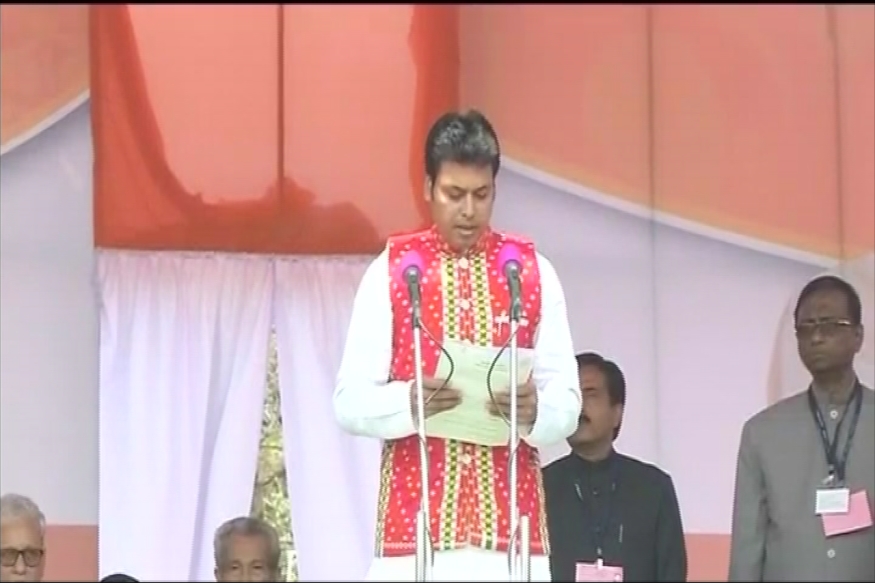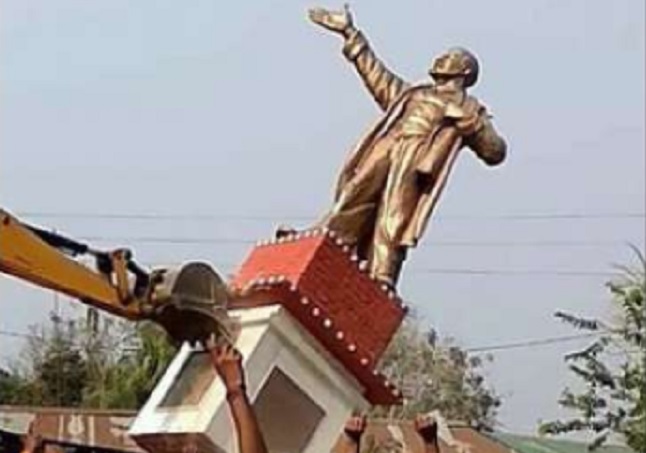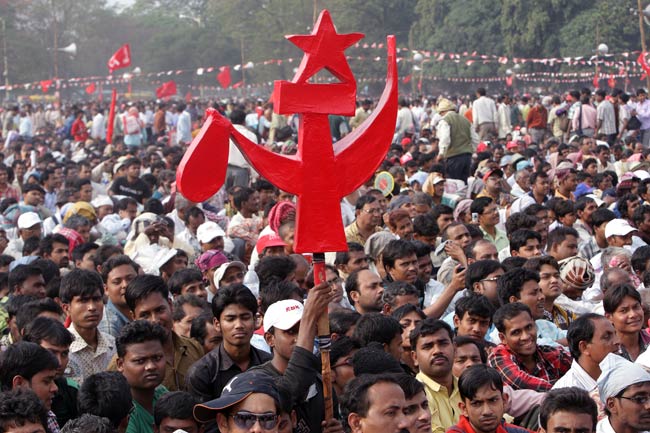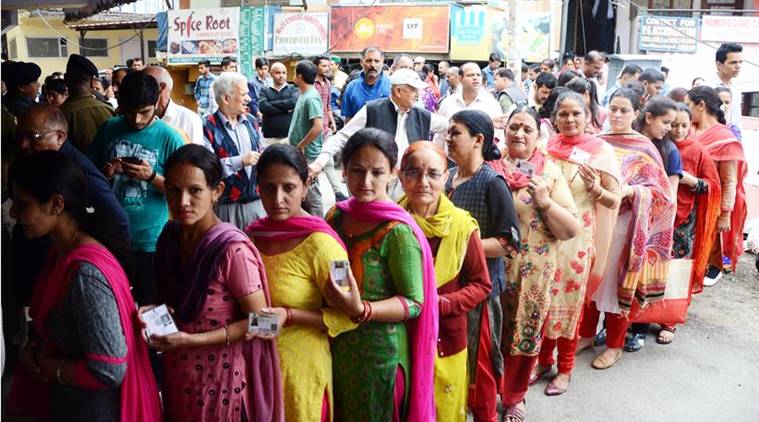
A new chief minister has sworn in Tripura. Obviously, BJP also played the same politics by selecting the Bengali immigrant as chief minister of the state as the CPM has been doing. In the din of despicable and condemnable attack on Lenin’s statue, the larger issues that these results have thrown have been ignored deliberately.
Normally, the elections in the North East have never been that publicized in the so-called national media as these times because it gives them to campaign further for ‘their’ party. Like the leader, the media today is in the campaign mode 24×7 and perhaps the aim is to ensure power to their party and wipe out the entire opposition. Though the results from North East were not unexpected given the resentment of the indigenous people in the region and how the SanghParivar played to the contradictions largely unresolved by the ruling party.
What disturbed me this time observing various website and video posts that none of the channels were bothered about other states once the things were clear for Tripura? It was really difficult to find out what was the status in other state as the PR agencies went overboard on Tripura. They relished the defeat of the left parties in Tripura. The honest man got defeated and BJP’s shameless loudmouth in the north east suggested that he should leave Tripura and take shelter elsewhere. If the defeat of an individual means that he should leave the country then it is not a great omen for democracy.
Over the years whenever the poll results would come, experts in TV studios would throw huge data on the viewers. The vote percentage, SC, ST, Muslim voting pattern, caste calculations and so many things but this time after Tripura’s victory, we did not get anything on any news website. Shocking that none tried to give us detail analysis of the election as if once BJP has come to power nothing else matter. Fortunately, election commission’s website provided all the details which are good for analysis.
According to Election Commission of India website in the sixty members assembly BJP got 35 seats with a vote share of 43% while CPIM got 16 seats with a vote share of 42.7%. Indigenous People’s Front got 8 seats with 7.5% vote share. Now in any liberal democracy vote share and seats must co-relate. How can the two parties with a meager difference of .3% have a difference of 19 seats? According to vote percentage BJP could have got about 25 seats while CPM deserved to have 24. But as usual such things happen and the powerful parties and people always use it to best of their benefit and hence once in power political parties do not want to speak about Electoral Reforms.
It also shows that the current system of the first past the post system is always helpful to manipulations of powerful people, moneybags in getting the desired results. We have been requesting all the political parties particularly those who know that the current electoral system is going to finish the smaller parties and will take India further towards one party democracy. They condemned the communist parties for the same but are now using the corrupt methods in the name of democracy to get into the system to protect the hegemony of the dominant communities and their corporate interests. It is time Indian political parties and social movements start talking of an inclusive democratic pattern where opposition is not an enemy but a need in defense of the people’s right.
But leave that apart, it is also time to do a detailed analysis of the so-called left rule in Tripura. We have seen their Bengal model with absolute monopoly of the brahmanical classes who used communism to protect their fiefdom and now changed their political loyalty to shift to Trinamul Congress but we know the lure of power at the Center will push them further towards the SanghParivar, the original party to protect their caste interest. Tripura demography was changed and manipulated in the past by the successive governments. The tribal population which was about 52.84% in 1901 was reduced to 28.44% by 1981. At the moment we are being informed that it is 31.8%. It is systematic erosion which left the indigenous people feeling betrayed by most of the political parties and compelling them to form their own Tripura Indigenous People’s Front.The long grievance of the tribal is issue of the Bengali immigrants from Bangladesh which they fear would further convert them into a minority in their own state. Even today, the leader of the Indigenous People’s Party has demanded carving out of a separate state for them. The Adiasis have been deeply disenchanted from the CPM because of its virtual contempt for the affirmative actions for the marginalized communities. In fact the Tripura SC-ST Reservation Act gave 17% reservation for the Scheduled Castes and 31% for the scheduled Tribe but according to many indigenous rights activists, this was never implemented in letter and spirit.
According to Tripura government’s own admission, there are 24% OBCs according to the data they covered in 1995 census but Tripura government has no policy for the reservation of the OBCs. The government says that it already has provided 48% reservation for the SC-STs and hence it is not possible for it to implement the OBC quota as it would go beyond 50% limit as decided by the Supreme Court but questions should be asked whether the government really tried about providing representation to OBCs. Secondly, don’t we have states in India where total reservation goes beyond 70% like Tamilnadu and Karnataka?
The fact is that we did not find anything sincere on part of the CPM government to provide fair representation to diverse sections of the communities living there and therefore most of them voted against them.
One of the major agenda of the left in the past has been land reforms but frankly speaking the indigenous people in Tripura felt that they have been deprived of their land and no sincere efforts were made to provide land to the landless.
It is true that BJP has been working harder in these regions. It played with the sentiments and insecurities of the earlier governments. The Bangladeshi immigrant card was played well and with proposed amendments in the citizenship act of 1955 which will give citizenship to Hindus coming from Bangladesh, there was an upsurge of support towards BJP particularly by the Bengali refugees but at the same point of time, this would create a great conflict between the indigenous people and the immigrants who would now be treated as citizens of India.
Tripura paid a price of the simplicity of indigenous people. The Bengali domination in Tripura and other north eastern states were a cause of discomfort for years. The issue of refugees created deep disturbances in Assam and Tripura. Is it not a serious flaw in our policy planning that despite a hugely populated which have been denied rights, political parties never gave indigenous people their due share? Why should they wait for another imported chief minister?
For the Hindutva party, North East has special reference. Assam became their focal point and now Tripura because this can influence national politics. Before the elections when NarendraModi went there, he promised people that all the illegal immigrants would be sent back but once the party came to power, it has promised that all the Hindu immigrants who are legal or illegal would be granted citizenship of India. This has obviously gladdened the heart of many but the tribal leadership understands this would be dangerous for them. It will automatically put the local Muslims in bigger danger because even if they have been living here in India for years
The problem with ‘secular’ elite of India is that they look all the issues of India through Hindu Muslim binary and try to locate things accordingly. The issue of various ethnic groups and indigenous people were never acknowledged on nationally even during the partition of India and that made them vulnerable to all kind of oppression both in India and Pakistan. After the division of Pakistan, a huge number of indigenous people became victim state apparatus in Bangladesh. In Bangladesh the Islamic groups openly supported by their armed forces indulge in persecuting them while in India, the Bengali Hindu dominance left them absolutely disempowered. Whether CPM or Congress, no efforts were made to assuage the feelings of the tribal in the state and the gap was filled by the BJP which made deep inroads in the tribal belt.
India’s leading parties have played politics with tribal and when they raise their issue of autonomy then our ‘nationalism’ comes into picture and define them as ‘anti national’. Does not it shock any one why the CPM never thought that an indigenous person could also lead the state ?
Borok People’s Human Rights Organisation has welcomed the renaming of Agartala Airport to Maharaja BirBikram Kishore ManikyaBahadurDebbarma Airport. The Maharaja is considered to be the greatest icon of the indigeneous people of Tripura. BPHRO Secretary Anthony Debbarma says that during the left rule you could find statues of Lenin, Praful Chandra Sen and Subhash Chandra Bose in Tripura but not of any indigenous heros. The deliberate attempt to ignore their contribution resulted in deep disgust towards the left parties. The Maharaja BirBikram was the architect of modern Tripura. Actually, it is said that the Maharaja brought RabindraNath Tagore to Tripura but today there are more statues and memorial of the Bhadralok icons in Tripura then any celebrations of the indigenous people says Anthony Debbarma.
Frankly, the RSS used this very well and one of the pre poll commitments of the alliance was regarding the renaming of Agartala airport.
According to BPHRO, the systematic disempowerment of the indigeneous people in Tripura resulted in from forcible eviction in the name of development. Wild Life Sanctuaries, Ecological Parks, National High Ways, Power Grid Corporation work which intend to supply electricity to Bangladesh.
In the Chandrapora Reserve Forest area, it was reported that the government actually got non-tribal ‘rehabilitated’ in the tribal people areas against all the norms. Anthony Debbarma also reported that in their own state the tribal never felt more alienated than ever. He also questioned the term used by many that AFPSA has been lifted by the government as so far there has never been any notification and the presence of the army is very much there in Tripura.
There is no doubt that CPM made Dashrath Deb, a tribal community leader as chief minister of the state but people says that there is no use of him since he was not well and had been ailing during that period. Later, Bengali Bhadralok became the main base of the party which has now shifted its loyalty to BJP.
In multicultural democracies the powerful dominant communities are shifting their loyalties to maintain the status quo. The Bengali immigrants who proudly claimed to be ‘progressive’ now openly flaunting their nationalism singing ‘Bharat Mata ki Jai’ and ‘Vandemataram’ so far unheard in Tripura.
The Tripura results have lessons for all of us and need to be serious analysed. One, the Hindutva party has carefully used the discontent of the people particularly those in the margin. It means that those who were supposed to work for them never really thought of them. Aspirations of the indigenous and other marginalised matters a lot for them because of historical denial and injustice and cantbe dismissed as identity politics. Tripura’s Adivasi felt that Bengali Bhadralok dominate them though CPM though it is another matter that BJP too found a Bengali immigrant to lead them.
When I asked a leader of indigenous movement as what is your reaction to the demolition of Lenin’s statue, his answer was though we condemn it and it was done by the BJP people yet we wanted to tell the people living in Delhi that Tripura has statues of all great icons except for their indigenous revolutionaries.
Social Justice is an important aspect of our political life and therefore the left governments everywhere failed to accept the reality that Indian society is not merely based on ‘economic disparity’ but on socio cultural discrimination which emanates from caste system. How come the left forces not keen to implement this agenda of social justice through affirmative action policies of the state. So, Tripura went on the lines of West Bengal under CPM where the governments refused to accept that there are OBCs in the state. In Tripura’s case, the government accepted but took shelter under 50% ceiling limit imposed by the Supreme Court though we have not seen any sincere effort on its part to push its affirmative programme for them. Ofcourse, SC-ST reservation too never fully honored there.
Third important take is encouraging the leadership of the marginalized and historically wrong communities in the party. None is suggesting that you compromise with the ideology but to say there are no leaders from these communities who are capable of leading is dangerous. It is not that someone made that statement but when we don’t find leaders at the decision making bodies, it indicate the same.
Fourth, Land Reforms and Forest Rights which are important for social justice and democratization of society remained unattended in Tripura.
And last was the active communalization by BJP through the proposed amendments in the citizenship act of 1955 which would allow every Hindu immigrant whether legal or illegal, to be the citizen of India while not providing the same to the Muslims who come here. This is bound to create more problems. Though the Indigenous people leaders are saying that they would oppose such discriminatory law yet it gladdened the heart of those who have relations in Bangladesh. While we have no issue with refugees being treated in this country in a dignified way, we have serious objection to its communal intents. The thing is that north eastern situation is precarious and polarization is the best politics of those who wish to reap its harvest elsewhere too but there has to be a simple liberal secular-constitutional response which is not visible even today.
And my last point is that we must campaign for proportionate electoral system so that results are not manipulated through divisions of votes and vote share decide the number of seats as happens in a majority of democracies world over except those with British colonial legacy. Most importantly diversity whether in terms of ideologies or identities must be celebrated as mark of our maturity and none should be discriminated on the basis of their identity.
Tripura was a peaceful state but the discontent of the people particularly the marginalized was not on that but on their participation and inclusion. An unjust peace is not acceptable to the marginalized as they seek their participation in power structure but riding on the piggy back of Hindutva nationalists too will be too dangerous a game for them. We know conflicts are bound to happen on various important issues when the Hindutva’s capitalist agenda is unleashed in rest of the country, Tripura can’t be untouched from that. Moreover, it is equally important how the Adivasi people respond to the purely communal agenda particularly citizenship amendment act. Let us wait and watch. The indigenous people crossing over to ally with BJP is a failure of the other political parties who were nowhere in picture. Shockingly, there are no political outfits of Dalit Bahujans in these states of North East which has left the field open for the Hindutva to grab. Congress left the space and their bhadralok leaders too switched to BJP in pursuit of power. So the most important point of democracy is diverse opposition space and alliance building in which the Hindutva politics used much more to its own benefit everywhere. Will the left and other forces of social justice ever learn from their monumental failures?
Vidya Bhushan Rawat is a social and human rights activist. He blogs at www.manukhsi.blogspot.com twitter @freetohumanity Email: [email protected]












































